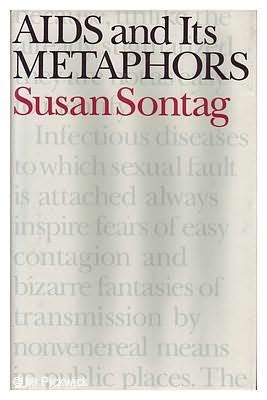Use TRIPOD to find books and other material owned by the Tri-College libraries.
Use WorldCat to find books not held by the Tri-College libraries.
In order to find books in either catalog, conduct either a relevant:
Keyword Search:
E.g., "same-sex marriage" AND (law OR legislat*)
("same-sex marriage" OR "gay marriage") AND normal*
(See the Search Tips tab for more information on how to construct keyword searches.)
Or Subject Search:
E.g., Sexual ethics
Same-sex marriage [full list, Tripod]
Same-sex marriage [Broad subject heading]
Same-sex marriage—Cross-cultural studies
Same-sex marriage—Handbooks, manuals, etc.
(Use the Browse Books & More link or use the Advanced Search function [limited to the subject field] to find additional subject headings.)
 AIDS and Its Metaphors
by
AIDS and Its Metaphors
by
Researchers can often find useful scholarship by identifying one particularly relevant book or article and seeing which sources that text cites. With print texts, this process might involve checking the bibliography. In some databases, you can also trace citations forward in time and find subsequent material that cites a particularly useful resource. Use the following databases to find a relevant resource and then see which later texts cite the one with which you start. Keep in mind, however, that the citations will no be comprehensive—i.e., the citations will often be limited by the scope of the database in which you're working.